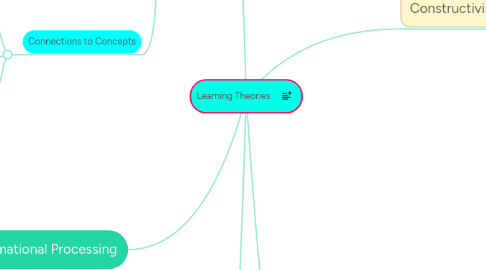
1. Informational Processing
1.1. Basic Principles
1.1.1. study of the mind and how it obtains, processes, and stores information
1.1.2. mind functions like a computer processor
1.1.3. input, processes, stored, retrieve information
1.1.4. Cognitive Load Theory:
1.2. Implications for Education
1.2.1. Cognitivism is suited well for problem solving, where the concepts are complex and must be broken down into smaller parts.
1.2.2. When problems are broken down into smaller parts, learners are not overwhelmed with incoming information and have time to process smaller bits.
1.2.3. Learning techniques
1.2.4. Technologies to use
1.2.5. Learning Implications
1.3. Connections to Concepts
1.3.1. mindmap
1.3.2. Digital citizenship poster
1.3.3. electronic note-taking
1.3.4. studying
1.3.5. Presentation tools
2. Behaviorism
2.1. Basic Principles
2.1.1. learner is viewed as passive
2.1.2. Skinner and operant conditioning
2.1.3. stimulus-response
2.1.4. shape learning with reinforcement
2.1.5. positive and negative reinforcement to increase desired behavior
2.2. Implications for Education
2.2.1. direct instruction
2.2.2. teacher-directed
2.2.3. lecture and demonstration followed by practice
2.2.4. measure learning by what you see
2.2.5. practice and performance are emphasized
2.2.6. reinforce behaviour through appropriate feedback
2.2.7. teacher gives the answer, students copy the teacher, and then students practice repititively
2.2.8. technology examples
2.3. Connections to Concepts
2.3.1. Study the ICT Program of Studies and Alberta Education to be prepared for the quiz
2.3.2. This course itself is blended, therefore lots of lectures and passive learning
2.3.3. Final exam review jeopardy game
2.3.4. Computer aids for teaching: YouTube videos to watch on our own time/during lecture
2.3.5. Socrative: student response system
3. TPACK
3.1. Basic Principles
3.1.1. Technology Knowledge
3.1.2. Content Knowledge
3.1.3. Pedagogical knowledge
3.1.4. Pedagogical Content Knowledge:
3.1.5. Technologial Content Knowledge
3.1.6. Technological Pedagogical Knowledge
3.1.7. Technological Pedagogical Content Knowledge
3.2. Implications for Education
3.2.1. T.K.
3.2.2. C.T.
3.2.3. P.K.
3.2.4. P.C.K.
3.2.5. T.C.K.
3.2.6. T.P.K.
3.2.7. T.P.C.K.
3.3. Connections to Concepts
3.3.1. T.P.K.
3.3.2. T.K.
3.3.3. T.C.K.
4. Constructivism
4.1. Basic Principles
4.1.1. study of a learner's own construction of knowledge
4.1.2. constructed through one's own personal experiences and interactions with the outside world
4.1.3. Build connections by actively interacting with the environment
4.1.4. Begin with complex problems and teach basic skills while solving problems
4.1.5. Teacher presents the problem, students solve it
4.1.6. Vygotsky's Zone of Proximal development as a tool to teach
4.1.7. Key Theorist: Seymour Papert believes in learning by “making” such as lego robotics
4.2. Implications for Education
4.2.1. best utilized when learners take control of the learning situation, such as in Problem-Based Learning
4.2.2. Ways to teach
4.2.3. Technology to use
4.2.4. Learning Implications
4.3. Connections to Concepts
4.3.1. ePortfolio assignment
4.3.2. Gizmo simulation assignment
4.3.3. Digital citizenship poster: create something new
5. Connectivism
5.1. Basic Principles
5.1.1. Key Theorists: George Siemens, Stephen Downes and Ryan Tracey
5.1.1.1. Downes
5.1.1.2. Tracey
5.1.1.3. Siemens
5.1.2. nurturing and maintaining connections is needed to facilitate continual learning
5.1.3. currency (up to date info) is the intent of all activities
5.1.4. capacity to know more, is more critical than what is currently known
5.1.5. ability to see connections between fields, ideas, and concepts is a core skill
5.2. Implications for Education
5.2.1. knowledge exists outside of the learner
5.2.2. learner makes connections between information to build knowledge
5.2.3. Learning is the process of creating connections and developing a network
5.2.4. technologies
5.2.5. Bookmarks and links
5.2.6. Learning
5.3. Connections to Concepts
5.3.1. Personal learning network
5.3.2. access information
5.3.3. search engines
5.3.4. bookmarks
5.3.5. connection
